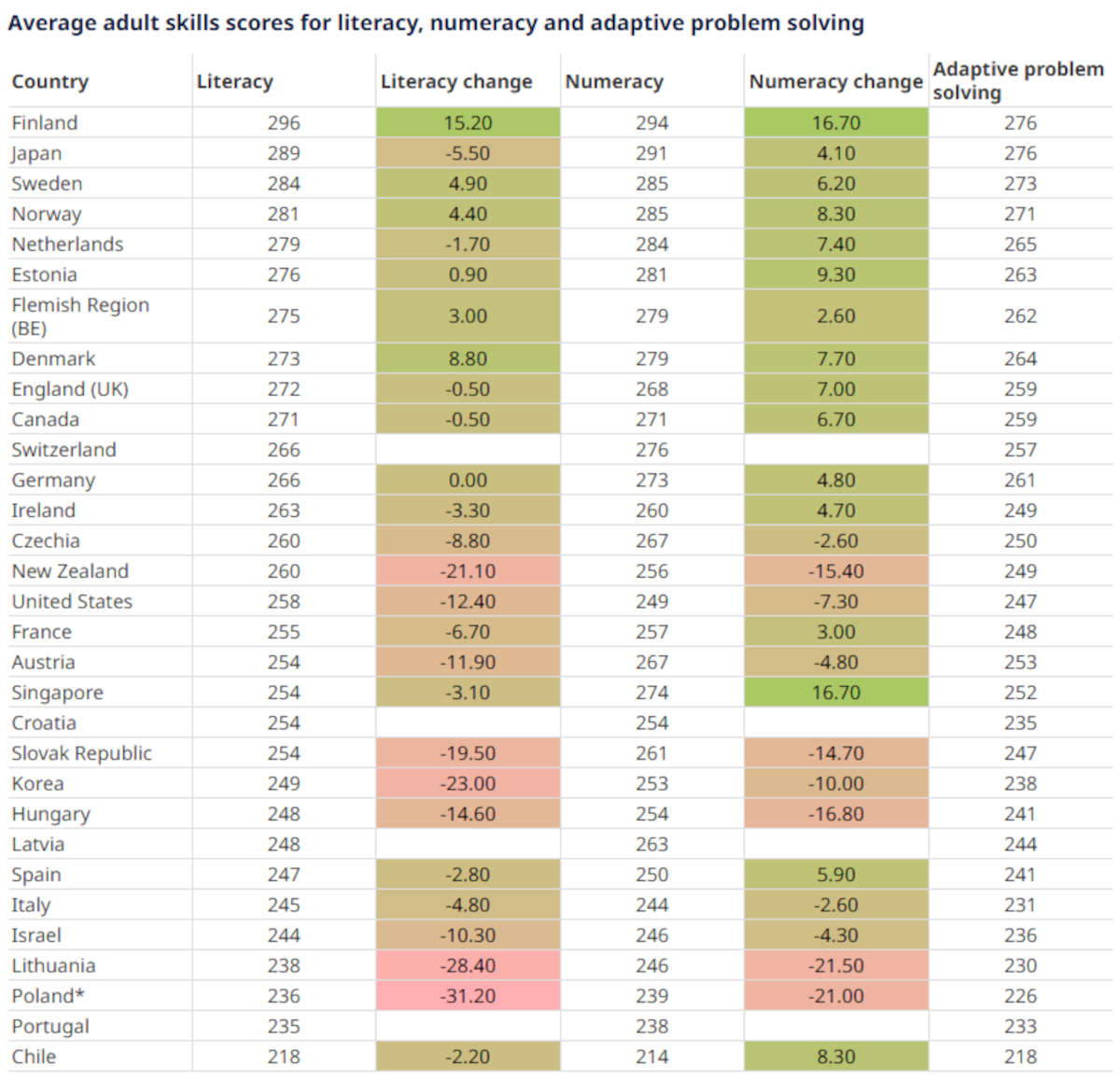Italy is a country of functional illiterates: we could summarize in a crude and perhaps even simplistic way the outcome of theOECD (Organization for Economic Cooperation and Development) survey on adult skills for 2023, the Survey of Adult Skills, carried out under the OECD’s Programme for the International Assessment of Adult Competencies (PIAAC), where adults are defined as individuals between the ages of 16 and 65. In fact, Italy ranks last out of the 31 countries of the organization analyzed, in all three surveys: the literacy survey, i.e., skills in reading and comprehension of written texts; the numeracy survey, numeracy skills; and the problem solving survey, the ability to solve problems.
The survey showed a mixed overall picture of proficiency in reading and text comprehension, numeracy and problem solving. At the top of the rankings are consistently Finland, Japan, the Netherlands, Norway and Sweden, which have demonstrated excellence in all areas, with significant percentages of their adult populations demonstrating advanced skills. However, on average in OECD countries, 18 percent of adults do not have even the most basic levels of proficiency in any of the domains. Yet these are, the OECD explains, fundamental skills for personal, economic and social development. Indeed, they are a necessary foundation for further learning and innovation and ultimately shape economic opportunity. Skills help adults manage complexity in both the private and public spheres, plus skilled adults can better navigate the modern information landscape, thereby contributing to more informed collective decisions and policy choices.

The 2023 survey assessments required participating adults to complete a series of tasks (also called assessment items), which could only be solved if they had a sufficient level of reading and text comprehension, numeracy, and problem solving skills. Their performance on these assessments was then used to estimate their proficiency in each of these skill domains. These estimates were reported on three separate scales from 0 to 500 points. The same scales were used to rank the assessment items according to their difficulty.
At each scale point, an individual with a given level of proficiency has a 67% chance of successfully completing tasks located at that same level. Adults with a given level of proficiency will have a lower probability of being able to successfully complete more difficult activities (those with higher values on the scale).
It is important to note, the OECD points out, that reading and text comprehension, numeracy and adaptive problem solving are separate skills, measured on separate scales. This means that direct comparisons of reading and text comprehension scores and numeracy skills, for example, are not meaningful. In other words, the fact that individuals (or a group) score higher in reading and text comprehension than in numeracy does not allow one to conclude that their reading and text comprehension skills are superior to their numeracy skills. Any comparison of performance between different domains must necessarily be relative in nature. For example, individuals (or a group) can be said to be relatively better in reading and text comprehension than in computational ability if their rank in the ordinal distribution of reading and text comprehension ability is higher than their rank in the distribution of computational ability.

In the ranking of reading and text comprehension skills, Italy occupies the sixth-to-last place: behind are only Israel, Lithuania, Poland, Portugal and Chile. Worse in numeracy skills: fourth to last place, worse than us are Poland, Portugal and Chile. Same result in problem solving: behind us are only Lithuania, Poland and Chile. At the top of the ranking is Finland, first in all three rankings, followed by Japan, Sweden, Norway and the Netherlands, which always occupy the second, third, fourth and fifth places.
In Italy, adults’ cognitive abilities remain essentially unchanged between 2012 and 2023, a trend that mirrors what has been observed in other countries. However, this stability comes with a significant gap to close compared to the average OECD performance. In our country, moreover, the results reflect wide internal disparities related to territorial factors (residents of northern and central Italy have scores equal to those of the OECD average, while in the mezzogiorno there are almost always values significantly lower than the Italian and consequently the OECD average), age, level of education and gender. A positive finding for our country concerns young people, who represent a crucial resource in a context marked by one of the highest aging rates globally. Adolescents and young adults (16-24 years old) perform significantly better than the rest of the population, standing out particularly in numerical skills, where they also outperform the 25-34 age group.
Regarding reading and text comprehension, 35 percent of Italian adults (OECD average: 26 percent) scored Level 1 or lower, meaning they have a low ability to comprehend a written text. Level 1 covers comprehension of short texts and organized lists when information is clearly stated, the ability to find specific information and identify relevant links. Individuals below Level 1 can at most understand short, simple sentences. At the other end of the spectrum, 5 percent of adults (OECD average: 12 percent) scored Level 4 or 5 in text comprehension. These adults can comprehend and evaluate long, dense texts on multiple pages, grasp complex or hidden meanings, and use prior knowledge to understand texts and complete tasks.
In numeracy skills, 35 percent of adults (OECD average: 25 percent) scored at or below Level 1. At Level 1, adults can do basic math with whole numbers or money, understand decimals, and find single pieces of information in tables or graphs, but may have difficulty with tasks that require multiple steps (such as solving a proportion). Those below Level 1 can add and subtract small numbers. Adults at Levels 4 or 5 are the best (6 percent in Italy, 14 percent on average in OECD countries and economies). They can calculate and understand rates and ratios, interpret complex graphs, and critically evaluate statistical statements.
In problem solving, 46% of adults (OECD average: 29%) scored at or below Level 1 proficiency. Adults at Level 1 can solve simple problems with few variables and little irrelevant information that does not change as they progress toward the solution. They have difficulty with problems with many steps or those that require monitoring of multiple variables. Adults below Level 1 include at most very simple problems, usually solved in a single step. About 1 percent of adults (OECD average: 5 percent) scored Level 4. They have a deeper understanding of problems and can adapt to unexpected changes, even if they require major reevaluation of the problem.
For anyone who wants to learn more, you can read all the data and analysis on the OECD website.
 |
| Italy, a country of functional illiterates |
Warning: the translation into English of the original Italian article was created using automatic tools. We undertake to review all articles, but we do not guarantee the total absence of inaccuracies in the translation due to the program. You can find the original by clicking on the ITA button. If you find any mistake,please contact us.